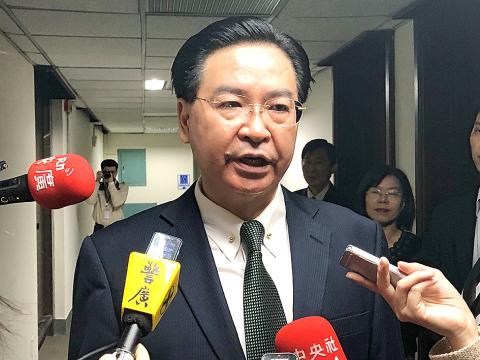Minister of Foreign Affairs Joseph Wu (吳釗燮) has called for Japan to engage in a security dialogue with Taiwan, as both nations have come under military pressure and threats from China.
In an interview with the Sankei Shimbun published yesterday, Wu called for Taiwan and Japan to initiate a security dialogue, saying that ensuring security is a shared responsibility of the two nations.
The newspaper called Wu’s call a rare move, as Taiwan has no diplomatic relations with Japan.

Photo: Lu Yi-hsuan, Taipei Times
Taiwan is looking forward to exchanges of views with Japan on ensuring security in light of increased activity by China’s armed forces in the Western Pacific in recent years and the threat it poses to both nations, Wu said.
Citing the close US-Taiwan security cooperation as an example, Wu said the lack of diplomatic ties with Japan should not be a hindrance to a security dialogue.
He also said that visits to Taiwan by high-ranking officials from the US administration have increased in frequency, while the administration of US President Donald Trump in June last year approved the sale of US$1.42 billion of arms to Taiwan.
The report said that after the US cut official diplomatic ties with Taiwan in 1979, then-US president Jimmy Carter signed the Taiwan Relations Act into law later that year, laying the legal foundation for security talks between the US and Taiwan.
There have been US military attaches assigned to the American Institute in Taiwan’s Taipei office since 2005, the report said.
In contrast, after Japan ended diplomatic relations with Taiwan in 1972, there has been a lack of legal foundation for exchanges between the two nations, the report said, adding that unofficial relations have only managed to bring about the appointment of one retired Japanese defense official to the Taipei office of the Japan-Taiwan Exchange Association.

CHAOS: Iranians took to the streets playing celebratory music after reports of Khamenei’s death on Saturday, while mourners also gathered in Tehran yesterday Iranian Supreme Leader Ayatollah Ali Khamenei was killed in a major attack on Iran launched by Israel and the US, throwing the future of the Islamic republic into doubt and raising the risk of regional instability. Iranian state television and the state-run IRNA news agency announced the 86-year-old’s death early yesterday. US President Donald Trump said it gave Iranians their “greatest chance” to “take back” their country. The announcements came after a joint US and Israeli aerial bombardment that targeted Iranian military and governmental sites. Trump said the “heavy and pinpoint bombing” would continue through the week or as long

TRUST: The KMT said it respected the US’ timing and considerations, and hoped it would continue to honor its commitments to helping Taiwan bolster its defenses and deterrence US President Donald Trump is delaying a multibillion-dollar arms sale to Taiwan to ensure his visit to Beijing is successful, a New York Times report said. The weapons sales package has stalled in the US Department of State, the report said, citing US officials it did not identify. The White House has told agencies not to push forward ahead of Trump’s meeting with Chinese President Xi Jinping (習近平), it said. The two last month held a phone call to discuss trade and geopolitical flashpoints ahead of the summit. Xi raised the Taiwan issue and urged the US to handle arms sales to

BIG SPENDERS: Foreign investors bought the most Taiwan equities since 2005, signaling confidence that an AI boom would continue to benefit chipmakers Taiwan Semiconductor Manufacturing Co’s (TSMC, 台積電) market capitalization swelled to US$2 trillion for the first time following a 4.25 percent rally in its American depositary receipts (ADR) overnight, putting the world’s biggest contract chipmaker sixth on the list of the world’s biggest companies by market capitalization, just behind Amazon.com Inc. The site CompaniesMarketcap.com ranked TSMC ahead of Saudi Aramco and Meta Platforms Inc. The Taiwanese company’s ADRs on Tuesday surged to US$385.75 on the New York Stock Exchange, as strong demand for artificial intelligence (AI) applications led to chip supply constraints and boost revenue growth to record-breaking levels. Each TSMC ADR represents

State-run CPC Corp, Taiwan (CPC, 台灣中油) yesterday said that it had confirmed on Saturday night with its liquefied natural gas (LNG) and crude oil suppliers that shipments are proceeding as scheduled and that domestic supplies remain unaffected. The CPC yesterday announced the gasoline and diesel prices will rise by NT$0.2 and NT$0.4 per liter, respectively, starting Monday, citing Middle East tensions and blizzards in the eastern United States. CPC also iterated it has been reducing the proportion of crude oil imports from the Middle East and diversifying its supply sources in the past few years in response to geopolitical risks, expanding